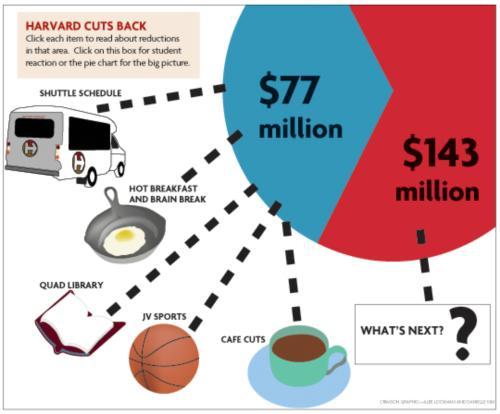
News
Harvard Grad Union Agrees To Bargain Without Ground Rules

News
Harvard Chabad Petitions to Change City Zoning Laws

News
Kestenbaum Files Opposition to Harvard’s Request for Documents

News
Harvard Agrees to a 1-Year $6 Million PILOT Agreement With the City of Cambridge

News
HUA Election Will Feature No Referenda or Survey Questions
First Round of Cuts Sweeps Harvard's Largest School

Faculty of Arts and Sciences Dean Michael D. Smith released an extensive list of cost-cutting measures Monday afternoon—including fewer hot breakfast offerings, the closure of two campus cafes, the downgrading of three junior varsity teams to club status, and reduced shuttle service.
The cutbacks published on the FAS Web site amount to $77 million in projected savings—a third of the total $220 million projected annual deficit that FAS administrators hope to close by July 2011. The cuts will be made over the next several months.
In an interview Monday, Smith said the cuts constitute the first step in a two-part plan to make up the budgetary shortfall. The second stage—branded “reshaping” by Smith—will attempt to close the remaining $143 million gap over the next two years by overhauling the structure of FAS, though professors say they continue to be confused by what the concept means.
Smith said it would have been difficult to plan the cuts earlier, since the Harvard Corporation—the University’s chief governing body—did not announce the eight-percent reduction in the payout rate until March.
In addition to several detailed cuts, such as the closure of the Widener Library Cafe and the Student Organizations Center at Hilles Penthouse coffee bar, the list included a number of vaguer items that implied possible future changes to staff hours, the number of Teaching Assistants and Teaching Fellows who help teach College courses, and long-term capital projects.
In Monday’s interview, Smith and College Dean Evelynn M. Hammonds declined to clarify those undefined measures, saying administrators are still in the decision-making process.
Smith declined to offer any specifics about what would happen to staffers now working in the closing cafes, saying only that the administration has not yet reached the point at which they can make concrete decisions about future layoffs.
When asked to cite areas where student life would improve as a result of the cuts, Smith had one answer: improved brain breaks—which will see 40 percent more funding next year.
“I’m a big fan of the brain breaks,” Smith said. “I hear that there’s not enough good food at night, so that was certainly one of our goals.”
Today’s cuts are the culmination of a process that began last December, when Smith urged all departments and administrative units to draft proposals listing possible cost-cutting measures to make up an economic shortfall then projected to be at least $100 million. FAS units identified more than $90 million of possible savings, and $77 million worth of the proposed cuts were selected for implementation, according to Smith.
The Web site will be updated with new cost-cutting measures as they are approved and implemented, but not every reduction will be posted on the site, Smith said at the Faculty meeting last week.
Smith declined to offer any specifics regarding the potential consolidation of different units such as centers, libraries, and academic departments, adding that a set of six working groups will be carefully examining that possibility.
—Staff writer Bonnie J. Kavoussi can be reached at kavoussi@fas.harvard.edu.
—Staff writer Esther I. Yi can be reached at estheryi@fas.harvard.edu.
Want to keep up with breaking news? Subscribe to our email newsletter.
Most Read
- Harvard’s Hyperfixation on Israel Is Academically Unserious
- Harvard Police Union Overwhelmingly Votes No Confidence in HUPD Chief Clay
- Trump Administration Conditions Harvard’s Funding on Eliminating DEI, Restricting Protests
- Facing Trump’s Ultimatum, Harvard Has No Easy Choices
- House Door Boxes Elicit Backlash Over Conservative Student Publication
